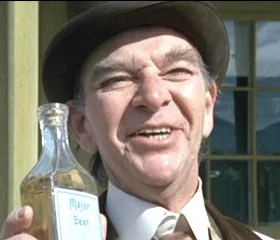Maybe because Romney isn't the right candidate?
It's a pretty good piece on American-style fascism by Irwin Stelzer for The Weekly Standard
here, but I couldn't help but notice once again how even very smart people pour their ideas into and project their hopes onto candidates even though there isn't the slightest bit of evidence to justify it. Consider all these phrases from the article, which on every issue Stelzer recommends as conservative reveal that Romney is already NOT on board:
... doesn’t mean that Romney should refuse ...
And where is Mitt Romney ...
Alas, that statement came not from Romney ...
Romney must know better than anyone ...
Why does Romney not agree with ...
Romney can propose a simple rule ...
Romney can propose eliminating ...
Finally, where is Romney every time . . ..
If Gov. Romney isn't already showing a firm grasp of free-market conservatism as defined by the neoconservative Weekly Standard, what is he on board with?
Don't we already know that Romney thinks ObamaCare is nothing to get angry about?
Or how about out-of-control government spending (is there any other kind?), the cri de coeur of the Tea Party movement? Romney has explicitly stated that he will not slash spending as president, even though it's the very ground cronyism walks on. His answer for that? Because cutting government spending in a slow-growth environment would throw America into a depression.
This tells you that Romney is no different than Obama in one very important respect: he's cool, in the deceitful sense that he allows supporters to think he shares their passions when he doesn't. Just as Obama has deeply disappointed the American far left, a president Romney will do the same to the right on every issue dear to them.
The caution and calculation of such cool cats often gives the first impression of ulterior motives. Alternatively, however, the coolness may simply be a mask for an underlying mediocrity, or even stupidity.
For example, the single stupidest thing that Obama and the Democrats have done to date was to insist that they prevented a depression and bailed-out everybody to do it. Arguably what they should have done is embraced the depression which did in fact occur in 2008-2009 and blamed it on Bush. They also should have let the depression happen big-time, cleansing the debt-overhang for the good of the country and punishing their enemies in the process. Republicans would have been finished for decades to come, just like in 1932.
And you thought Obama was the smartest president ever.
Can Romney be far behind him? At this juncture in the campaign you would think a smarter candidate would be consistently avoiding everything which depresses the mood of the base of his party. If the neocons aren't happy with Romney, who is?
Not that it really matters much what Romney says or doesn't say about this, that or the other thing when it comes to actual governing. After all, the president proposes, but it is the Congress which disposes. (Unless, of course, you're Obama, who disposes of the Congress fairly routinely, whether on war powers in Libya, recess appointments or immigration.) America's problem with crony capitalism can indeed be made much worse by a president like Obama for whom it becomes his motto, no doubt about it. An awful lot of money has been wasted on failed green energy schemes.
But cronyism in America is really the specialty of our ever more remote representatives to the US House and Senate. Our nearly intractable problems of waste, corruption, and deceit which they are responsible for have taken over ninety years to develop, and they won't go away in an instant. What we most certainly need is to destroy the concentration of spending power in the hands of a few powerful men and women in the House and Senate.
One way to do that is to restore representation numbers to the constitutional ratio of 1 to 30,000, the number one answer to the constitution's number one perceived deficiency during the ratification process over two centuries ago. The immediate effect of installing thousands of new Congressmen today would be to dilute the power of the existing cabal of skilled cronies. It is true that as happened in the 1920s there seems to be nothing that would again prevent Congress from flouting that provision of the constitution even if we restore representation to the status quo ante. The last thing we need is 10,267 corrupt representatives instead of the 435 we've already got. Still, short of revolution in the streets, it's probably the best and most constructive alternative we have presently available, and probably a more certain guarantee of keeping things like ObamaCare from happening in future than mere reliance on one political party controlling the levers of a government distant from the people.
Another way which would help is to repeal the 17th Amendment, and return election of senators to the States and take it away from the globalized monied interests. That is no guarantee against cronyism, to be sure, but at least States would have actual representation in Washington again as the Founders intended. As it is, the only representation they have is before the bar of justice, if it agrees to hear the case at all. Ask the 26 States who lost in front of John Roberts how good they're feeling about that today. ObamaCare, after all, originated in the Senate. All things being equal, senators from those 26 States would not have voted for it and we wouldn't be having this enormous controversy.
These sorts of returns to originalism might actually make a difference going forward, but all the evidence we have right now is that Romney has as little interest in them as he does in the issues animating the base of his party.
A Romney in the White House will most likely mean just another dutiful tax collector for the crony welfare state, like the rest of them.




































